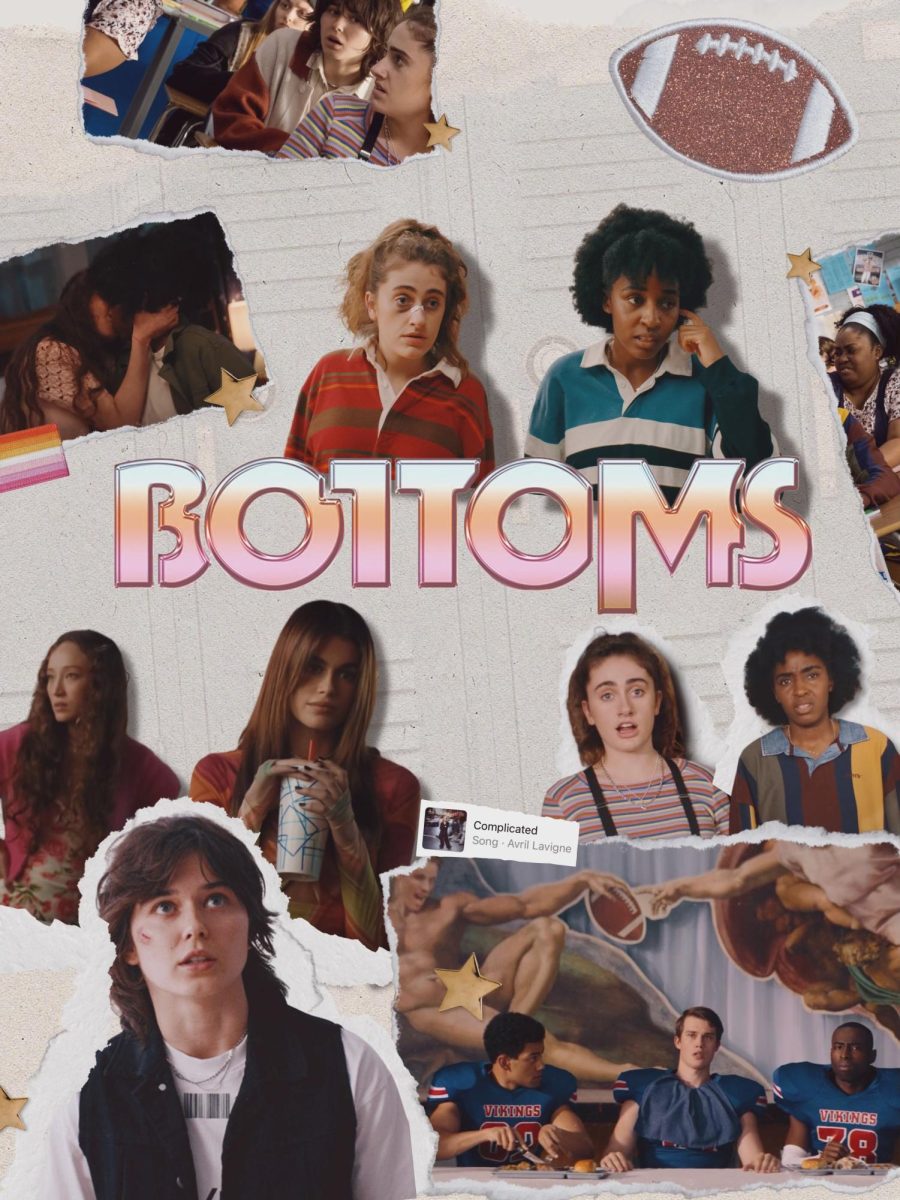Emma Seligman’s Bottoms is the vulgar, gory, Queer, and female-dominated version of Superbad that is making up for lost time.
It’s no secret that early 2000’s cinema did not exactly cater to the needs of anxious, insecure, Queer kids navigating adolescence, representation-wise. Just think, when’s the last time you’ve seen one of those iconic, plain white background, perfectly saturated, Rom-com-style posters advertising a lesbian, coming-of-age, high school film? Right.
Bottoms follows two suburban lesbians, both best friends with contrasting personalities, enhancing their comedic timing, jaw-dropping one-liners, and questionable, yet hysterical, decision-making throughout the film. Our leads are PJ and Josie, played by Shiva Baby’s Rachel Sennott, who also co-wrote the film, along with Ayo Edebiri, as she continues her reign of owning the screen in every genre she has taken on this past year. PJ acts as the impulsive, high-energy, no-filter, best friend to Josie’s timid and adorably awkward personality. It goes without saying that the whole “opposites attract” theory applies to these heroines.
The two are becoming angsty and desperate to attract their picture-perfect, Victoria’s Secret modelesque crushes, before graduation. Alas, the girls have a failed attempt at wooing both cheerleaders, Isabel, portrayed by the ethereal Havana Rose Liu, and Brittany, played by Kaia Gerber, who is nothing short of a carbon copy of her mother, Cindy Crawford.
A previous sarcastic remark made by Sennott’s character, PJ, in the first five minutes of the film accidentally creates our main fabrication, and later conflict. “Yeah, we went to juvie,” Sennott’s character jokes, with eyes rolling clockwise, in conversation with a friend after the questioning of Josie’s visible arm injury.
Later, talk about a certain rival school by the name of Huntington, looking to wreak havoc upon PJ and Josie’s Rockbridge Falls High School, hits the fan. This is where the spontaneous idea of starting a fight club to teach female students how to defend themselves against the Huntington football players, is born. PJ, thinking back to the previous joke made regarding a wild stay in juvie, starts to believe that if she and Josie told students that they really were ex-juveniles, they could potentially gain some street-cred and credentials for their new club. PJ’s idea goes on to explain how the fight club will essentially be disguised as a community for female empowerment and solidarity, but in reality, will just be a way for she and Josie to lure their crushes in and eventually hook up.
I personally have a very positive review of this film. After anticipating its release for months, I sat in the Jacob Burns Film Center, with some friends of mine, buzzing with excitement and crying with laughter during most sequences. The film moves at a lightning pace with absurd comedy, tender moments, and aesthetically pleasing visuals. It was everything I imagined it would be.
I may be a bit biased in this scenario, but my particular favorite would have to be Ayo Edebiri who I had the pleasure of working with on Molly Gordon’s Theater Camp in the summer of 2022. I also immediately fell in love with the character of Hazel Callaghan, played by Ruby Cruz, notable for being the first gay Disney “princess,” in Disney +’s Willow. Red, White, & Royal Blue’s Nick Galitzine also co-stars as the blonde-haired, air-headed, all-American jock offering a comedic style, impressive considering his following directly behind the summer of Ryan Gosling’s Ken. Every time he was on screen, he was absolutely absurd in the best way. I give such credit to Emma Seligman and Rachel Sennott for creating a clever gender role swap in the way they chose to portray Galitzine’s character, Jeff, as the “dumb blonde” football player, while Havana Rose Liu and Kaia Gerber acted as the assertive, badass cheerleaders. It was refreshing and entertaining to say the least.
I have found that there are many mixed reviews of the film. From my point of view, no one should have anticipated the film to be one of academy award winning quality. That was never the point or intention. From the beginning, the objective was to give Queer audiences a modern-day Weird Science or Wedding Crashers they could relate to and appreciate. The general consensus appears to be that audiences are content with this infamous trope displayed in cinema, getting an updated and more inclusive twist. And, to really drive it home, the 2002 hit “Complicated” by Avril Lavigne played for an entire two minutes. How’s that for an early 2000’s Rom-com style?
See Bottoms in select theaters, or rent it through Amazon Prime.

